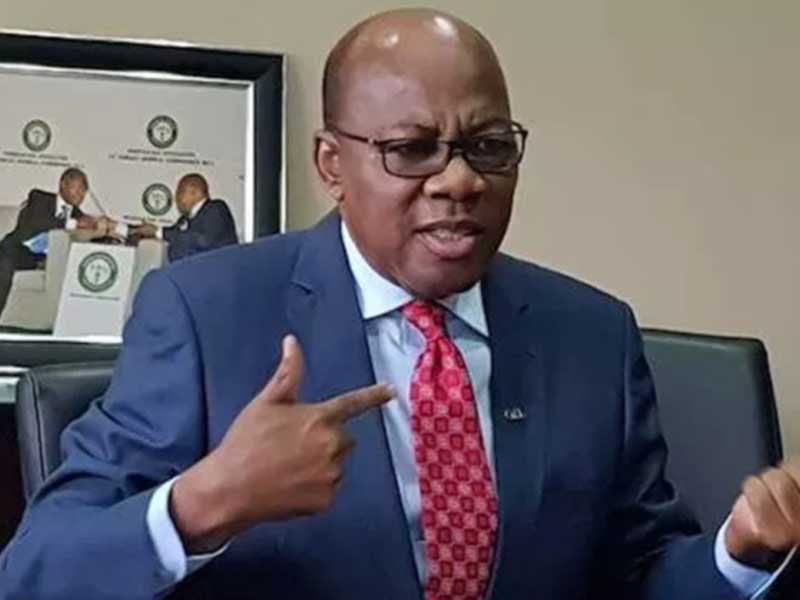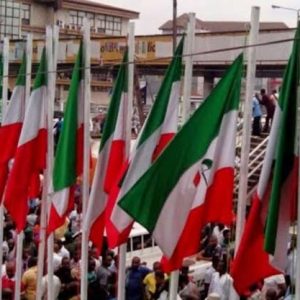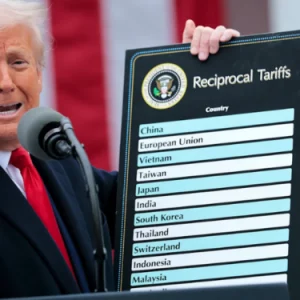Former President of the Nigerian Bar Association (NBA) and Senior Advocate of Nigeria, Dr. Olisa Agbakoba, has urged the federal government to embark on bold structural reforms capable of building a ₦1.5 quadrillion economy and stabilizing the naira within the next decade and a half.
In a letter addressed to the Minister of Finance and Coordinating Minister of the Economy, Mr. Wale Edun, Agbakoba commended the Tinubu administration’s efforts to restore macroeconomic stability but cautioned that persistent exchange rate volatility remains Nigeria’s most pressing challenge.
He argued that the naira’s weakness stems from the absence of strong “economic fundamentals,” stressing that unless tangible value is created to back the currency, volatility will persist.
Agbakoba proposed three transformative reforms – land and real estate titling, credit economy expansion, and agricultural mechanization – which, he said, could unlock over ₦1.5 quadrillion in dormant economic value and fundamentally restructure the Nigerian economy.
Citing studies by the World Bank, PwC, and his firm, Olisa Agbakoba Legal (OAL), he observed that about 90 percent of land and real estate in Nigeria have defective or no titles, a situation that traps immense wealth as “dead capital.”
He referenced Peruvian economist Hernando de Soto’s work, The Mystery of Capital, which shows how formal property rights can turn untapped assets into productive capital in developing economies.
“Property titling reform transforms dead capital into legally recognized assets,” Agbakoba said. “Owners can then use land or homes as collateral to access credit, releasing equity locked in real estate and injecting liquidity into the financial system.”
He noted that the federal government’s ongoing National Land Registration, Documentation and Titling Programme provides a solid foundation for reform but urged its acceleration and integration across federal and state levels.
By digitizing land records and harmonizing property laws, he said, Nigeria could “create an instant credit market worth potentially thousands of times our GDP.”
The move, he added, would deepen naira-denominated asset markets, reduce dependence on dollar-based investments, and strengthen demand for the local currency.
Using conservative World Bank and PwC estimates of $900 billion in dead capital, Agbakoba said that, at an exchange rate of ₦1,500 to $1, the value equals about ₦1.5 quadrillion.
“The economic impact of releasing ₦1.5 quadrillion into productive use cannot be overstated,” he emphasized. “It would provide sustainable backing for the naira and create a foundation for long-term prosperity.”
Turning to the second pillar of his proposal, Agbakoba said that Nigeria’s heavy reliance on cash transactions limits economic growth.
“Nigeria operates a cash economy that restricts people to what they can afford,” he wrote. “In contrast, a well-developed credit system allows people to buy what they cannot afford provided they can manage debt.”
He explained that 90 percent of Americans own homes through mortgages – a model Nigeria could replicate through a strong legal and policy framework.
“Any Nigerian who can pay rent can afford a mortgage,” he said, “but this is impossible without credit infrastructure.”
Agbakoba estimated that granting ₦300,000 in credit facilities to each of Nigeria’s 200 million citizens could inject ₦60 trillion into the economy.
Such naira-based credit, he said, would boost domestic consumption, support local production, and reduce pressure on foreign exchange.
“A thriving naira credit market will deepen domestic financial systems and make the currency more attractive as an asset, reducing speculative attacks and exchange rate volatility,” he added.
The third reform area, agricultural mechanization, focuses on boosting productivity and transforming the sector from subsistence to commercial scale.
Agbakoba drew a stark comparison between the U.S. and Nigeria, noting that while only 2 percent of Americans work in agriculture, the sector contributes $1.5 trillion annually to their GDP.
By contrast, 30 to 38 percent of Nigerians are employed in agriculture, yet the sector contributes less than $50 billion annually. “The difference,” he said, “is productivity, not population.”
He argued that Nigeria’s agriculture remains trapped at a subsistence level due to poor access to credit and the use of manual tools such as hoes and cutlasses.
“Defective land titles prevent farmers from using their land as collateral,” he explained. “Mechanization, supported by secure land rights, would attract capital, increase productivity, reduce post-harvest losses, and enhance food security.”
Agbakoba further stressed that achieving food self-sufficiency would save billions in foreign exchange spent on food imports and strengthen the naira.
“When a nation feeds itself and exports its surplus, its currency strengthens naturally,” he said.
He added that agricultural transformation would also expand the manufacturing value chain – from processing and packaging to logistics and exports – creating jobs and boosting foreign reserves.
Summarizing his recommendations, Agbakoba said the three reforms – land titling, credit expansion, and mechanized agriculture – if properly executed, would anchor the naira’s value and drastically reduce volatility.
“These reforms, combined with progress in oil and gas, maritime, and manufacturing sectors, can stabilize the naira and set the economy on a path to sustainable growth,” he asserted.
Acknowledging the enormity of the task, he described the reforms as “painstaking but doable,” citing the success of recent tax reforms as proof that transformation is achievable.
“The difference between incremental improvement and transformative change,” he said, “is ambition matched with execution.”
Agbakoba enclosed his firm’s October policy paper titled “Devolution is the Solution: Foundational Reform Agenda for Nigeria’s Transformation” for the minister’s consideration.
He concluded with optimism that if the government embraces these measures, “the naira will find its fundamentals, the economy will find its footing, and Nigeria will find its prosperity.”
Stay ahead with the latest updates!
Join The Podium Media on WhatsApp for real-time news alerts, breaking stories, and exclusive content delivered straight to your phone. Don’t miss a headline — subscribe now!
Chat with Us on WhatsApp







